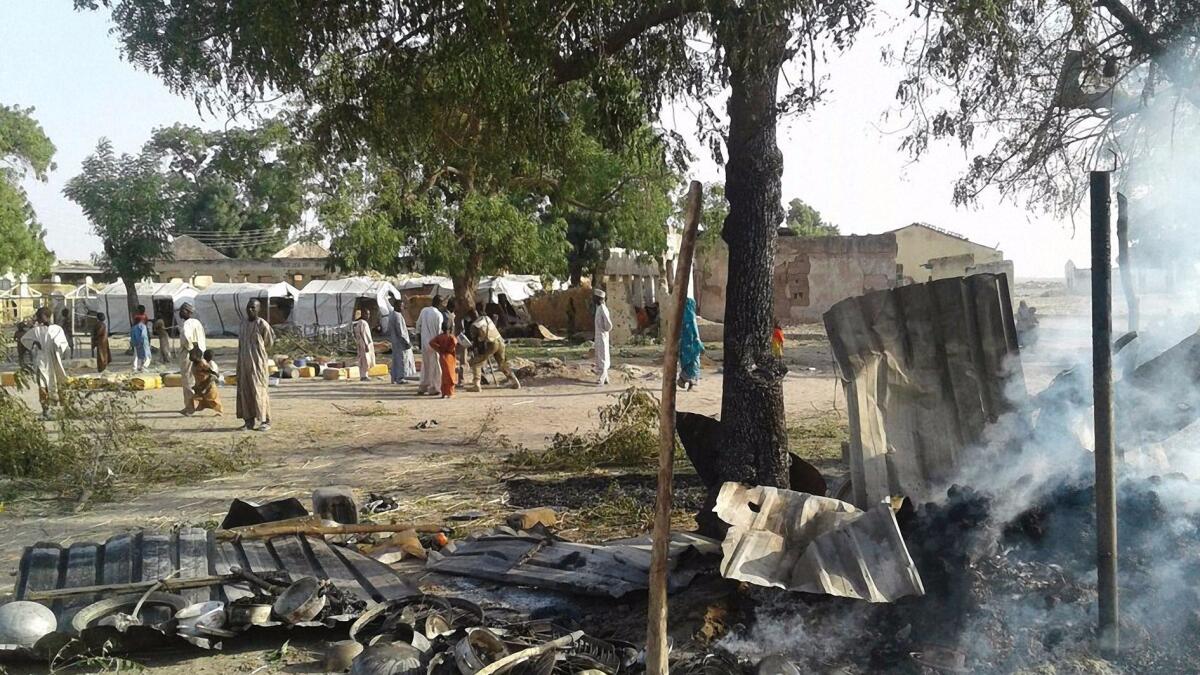Nigerian fighter jet mistakenly bombs refugee camp, killing at least 52, aid group says

- Share via
Reporting from MAIDUGURI, Nigeria — The Nigerian air force accidentally bombed a camp for displaced people Tuesday, killing at least 52 in what the humanitarian group Doctors Without Borders called a “shocking and unacceptable” tragedy.
More than 100 others were wounded when air force bombers mistook the camp for a hide-out of Boko Haram, the Islamist extremist group that has waged an insurgency in northeastern Nigeria for more than 13 years.
The casualties included both displaced people and aid workers, including six people with the International Committee of the Red Cross, the ICRC said.
The bombing occurred at a camp in Rann, northeastern Nigeria, near the Cameroonian border about 9 a.m. The Red Cross said its team had been bringing desperately needed food aid to 25,000 people there.
Doctors Without Borders, which also had workers present at the bombing, put the number of deaths at 52, but some reports suggested the casualties were significantly higher.
Nigerian President Muhammadu Buhari received news of the bombing “with deep sadness and regret.”
“President Buhari condoles with the families of the dead, wishes the wounded divine succor, leading to full recovery and sympathizes with the Borno state government,” a statement from the presidency said.
He said it was a “regrettable operational mistake” in what he called the final mopping up stages of the government’s battle against Boko Haram. The militant group, which is affiliated with Islamic State, wants to establish an Islamist state in Nigeria.
Military commander Maj. Gen. Lucky Irabor confirmed the accidental bombardment, saying “some” civilians were killed. He said there would be an investigation into what went wrong.
The bombing occurred as Nigeria faces a humanitarian catastrophe in the northeast of the country, where 2.1 million people have been displaced by conflict and 4.7 million people are in dire need of humanitarian aid.
Aid agencies have faced serious difficulty in reaching remote areas, mainly because of the danger of attack by extremists.
U.N. agencies have warned that remote parts of northeastern Nigeria face possible famine in coming months.
“This large-scale attack on vulnerable people who have already fled from extreme violence is shocking and unacceptable,” Jean-Clement Cabrol, Doctors Without Borders’ director of operations, said in a statement. “The safety of civilians must be respected. We are urgently calling on all parties to ensure the facilitation of medical evacuations by air or road for survivors who are in need of emergency care.”
The International Federation of the Red Cross and Red Crescent Societies said humanitarian agencies needed to be able to do their work safely.
“We renew our call for aid workers to be able to operate safely and be allowed to deliver assistance where it’s needed most,” the organization tweeted.
Doctors Without Borders released photographs of bombed shelters and patients affected by the blast. In one picture, two men carry a wounded child, with a bandaged head.
Peter Lundberg, U.N. deputy humanitarian coordinator in Nigeria, said the U.N. had evacuated eight wounded Red Cross workers by helicopter to Maiduguri, the Borno state capital.
“We are in total shock over today’s airstrike on Rann IDP [internally displaced persons] camp,” he tweeted. “We are preparing to airlift more lifesaving medical supplies and medical staff tomorrow to Rann.”
Nigerians reacted with horror to news of the bombing. One key critic of the military, Oby Ezekwesili, who led a campaign to press the previous government to do more to free nearly 300 schoolgirls abducted by Boko Haram in 2014, said Tuesday’s bombing was a major tragedy and blamed intelligence failures.
“Bombing of an IDP camp by our fighter jet is an example of how COSTLY Intelligence failure can be for military action. There’s a BIG LESSON,” she tweeted.
Nigeria has made significant strides against Boko Haram in recent months, but critics question whether the extremist group has been crushed, as claimed by the government. The group continues to mount regular suicide bomb attacks, mainly using teenage female bombers.
Analyst Ryan Cummings said airstrikes were usually used in attacks on territory controlled by enemy forces, rather than in final “mopping up” operations, suggesting the government didn’t have full control of northeastern Nigeria.
Cummings, with the Signal Risk security analysis company, said in a tweet that this kind of tragedy could happen when insurgents still held territory and the military lacked the local intelligence to distinguish an IDP camp from a Boko Haram camp. He added that the tragedy indicated that humanitarian agencies were forced to operate in unsecured areas, despite the government’s insistence it was in control.
Cummings wrote in a recent analysis that Nigeria faced difficulties repopulating and defending the vast northeastern area where Boko Haram has been operating. Nigeria’s military had complex logistical problems with food, supplies and ammunition, he wrote.
“It is also held back by the prevalence of corruption: There are allegations that military officers have been selling weapons and supplies to Boko Haram members, and that the sect may even be privy to military intelligence such as the movements of commanders spearheading the fight against the Islamist movement.”
ALSO
Search for missing Malaysian Airlines Flight 370 ends after nearly 3 years
British prime minister lays out plans for a ‘stronger, fairer, more united’ country after ‘Brexit’
Music festival in Mexico turns tragic as gunman leaves at least five dead, 15 injured
UPDATES:
3:25 P.M.: Updates throughout with staff reporting, details, quotes.
11:20 a.m.: This article was updated with a revised casualty report for Red Cross workers.
9:45 a.m.: This article was updated with a report that 20 Red Cross volunteers are among the dead.
This article was originally published at 9:05 a.m.
More to Read
Sign up for Essential California
The most important California stories and recommendations in your inbox every morning.
You may occasionally receive promotional content from the Los Angeles Times.










